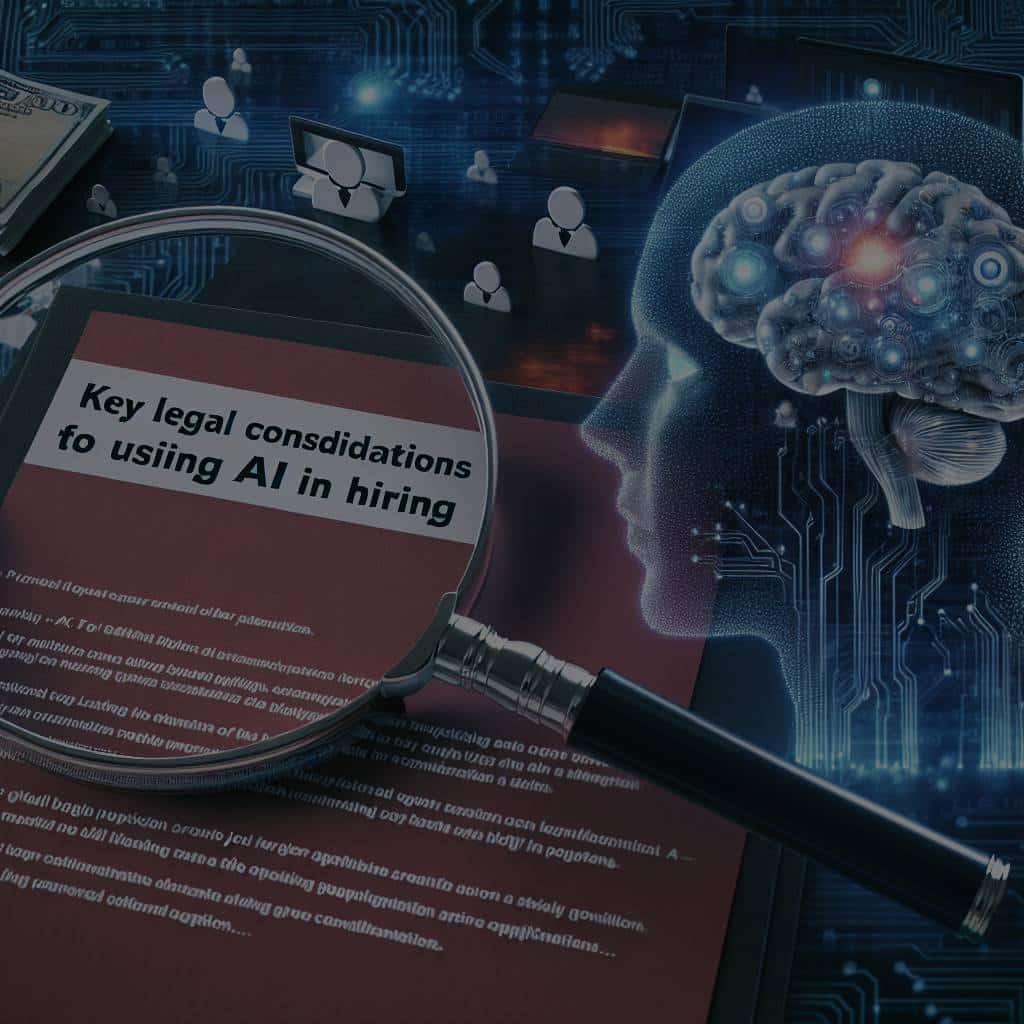What Are the Key Legal Considerations for UK Businesses Using AI in Hiring Practices?

Artificial Intelligence (AI) is steadily finding its way into many sectors, including employment. You, as UK businesses, are increasingly turning to AI as a tool to streamline the hiring process and make it more efficient. However, the use of AI in recruitment also raises several legal questions. This article explores the key legal considerations that you should be aware of when using AI in your hiring practices to ensure compliance and minimise risks.
Legal Framework Governing AI in Employment
AI in employment is subject to several legal frameworks that aim to regulate its use and protect both businesses and employees. A clear understanding of these laws will keep you on the right side of the law.
Also to see : Strapping materials: innovative and efficient solutions
In the UK, the government has issued several regulations and guidelines to govern the use of AI in employment. The Data Protection Act 2018 is one of the primary legal frameworks that you must adhere to. This law requires businesses to handle all data, including those processed by AI systems, in a lawful, fair, and transparent manner. Failure to comply with this Act could expose your businesses to severe financial penalties.
The Equality Act 2010 is another crucial law to consider. This Act makes it illegal to discriminate against candidates based on protected characteristics such as age, sex, race, religion, or disability. If your AI system is found to unfairly filter out certain groups of people, you could be held legally responsible for discrimination.
In the same genre : How Can UK Health Clinics Use Social Media to Promote Preventative Care Services?
In addition to these laws, you also need to adhere to the General Data Protection Regulation (GDPR). This regulation stipulates how you should collect, process, and store personal data. It also grants individuals the right to access, correct, and delete their personal data.
Reducing Risks: The Role of Transparency and Bias Minimisation
The use of AI in hiring comes with its inherent risks. To manage these risks, you should strive to promote transparency and minimise bias in your AI systems.
Transparency in AI systems refers to the ability to understand the logic and decision-making process of the AI. As a business, you are required under the GDPR to explain to candidates how your AI system works, the data it uses, the logic of its decision-making process, and the potential consequences for the candidate. Transparency helps to build trust between your business and candidates, and it also allows you to verify that your AI system is making fair and unbiased decisions.
Bias minimisation is another crucial aspect. Bias in AI systems can lead to discriminatory hiring practices, which are illegal under the Equality Act 2010. To minimise bias, you should ensure that your AI system is trained on diverse and representative data. You should also regularly review and test your AI system to detect and correct any biases.
Protecting Candidate Data: A Legal Obligation
Data protection is a legal obligation for businesses using AI in hiring. The Data Protection Act 2018 and the GDPR impose strict requirements on how you should handle candidate data.
Firstly, you must obtain explicit consent from candidates before collecting and processing their data. You should also inform candidates about the purpose of data collection and how their data will be used. Additionally, you must ensure that candidate data is stored securely to prevent unauthorised access. In the event of a data breach, you are legally required to notify the relevant authorities and the affected individuals within a specified timeframe.
Secondly, you should only collect and process data that is necessary for the hiring process. Excessive data collection could be seen as an invasion of privacy and could put you on the wrong side of the law.
Finally, candidates have the right to access their data, correct inaccuracies, and request deletion of their data. You should have systems in place to facilitate these rights and respond to such requests promptly.
Balancing AI Advancements and Legal Compliance
As businesses, you should strive to balance the benefits of using AI in hiring with the need for legal compliance. While AI can make the hiring process more efficient, you must also consider the potential legal implications of its use.
Incorporating an AI Ethics Board or a similar body within your organisation can be beneficial. This board can provide guidance on ethical and legal issues related to AI. It can also help you to develop internal policies and procedures to ensure that your use of AI is in line with legal requirements and ethical standards.
You should also invest in training for your team to understand the legal aspects of using AI in hiring. This will not only help you to avoid legal pitfalls but also build a culture of data protection and respect for candidates’ rights within your organisation.
In conclusion, the use of AI in hiring is a complex process that requires careful consideration of various legal factors. By understanding the legal landscape, promoting transparency and bias minimisation, protecting candidate data and balancing AI advancements with legal compliance, you can leverage AI in hiring while minimising legal risks.
Intellectual Property Rights and AI in Hiring
In the world of AI used in hiring practices, intellectual property rights often surface as a pivotal point of discussion. There stands an important question: who owns the rights to the AI-created content?
Intellectual property (IP) refers to creations of the mind, such as designs, images, or symbols used in commerce. AI systems, particularly machine learning models, can generate novel outputs that may be considered valuable IP. However, the ownership of these outputs is often a complex issue due to the unique nature of AI technology.
The UK has yet to clarify specific laws regarding AI and IP rights. However, the traditional IP law states that the creator of a work is the initial owner of its IP rights. In the case of AI, determining the ‘creator’ can be challenging. Is it the AI system, the developers of the AI system, or the business that uses the AI system?
While the law seems to lean towards the developers or the using business as IP owners, the lack of explicit laws leaves a grey area. This ambiguity could potentially expose businesses to legal disputes over IP rights. Therefore, it is crucial for businesses to proactively address this issue, for instance, by establishing clear terms and conditions with AI developers regarding IP rights.
Government Regulators and AI in Hiring
Government regulators play a pivotal role in overseeing the use of AI in hiring to ensure that businesses do not misuse it and infringe on candidates’ rights. They offer a regulatory framework to guide businesses in using AI ethically and responsibly.
In the UK, the Information Commissioner’s Office (ICO) is the main government regulator overseeing data protection and privacy. The ICO has the power to enforce data protection laws, including the Data Protection Act 2018 and the GDPR. It can issue fines and sanctions against businesses that violate these laws.
Meanwhile, the Equality and Human Rights Commission (EHRC) is responsible for enforcing the Equality Act 2010. If your AI system is found to discriminate against candidates based on protected characteristics such as race, sex, religion, or sexual orientation, the EHRC can take legal action against you.
To ensure compliance, businesses should keep abreast of the latest guidance and advice from these regulators. Businesses should also engage actively with regulators, for instance, through consultations and white papers, to contribute to the development of AI regulations that are pro innovation and foster public trust.
Conclusion: Towards Ethical AI Use in Hiring
In the rapidly evolving landscape of AI use in hiring, legal considerations are of paramount importance. Understanding and adhering to the legal requirements can save businesses from costly penalties and protect the rights of candidates.
The legal landscape surrounding AI in hiring practices is a complex web of data protection requirements, equality law, intellectual property rights, and government regulation. A holistic understanding of these areas can provide a solid foundation for businesses to build their AI hiring practices.
Furthermore, businesses need to actively foster transparency and bias minimisation in their AI systems. This will ensure that the recruitment process is fair and equitable, thereby maintaining public trust and civil society’s acceptance of AI in hiring.
As businesses navigate through the intricate waters of AI in employment law, they must remember that compliance is not the ultimate goal. The focus should be on leveraging AI to improve the hiring process while respecting and protecting candidates’ rights. Only then can AI truly revolutionise the future of hiring practices in a legal and ethical manner.
